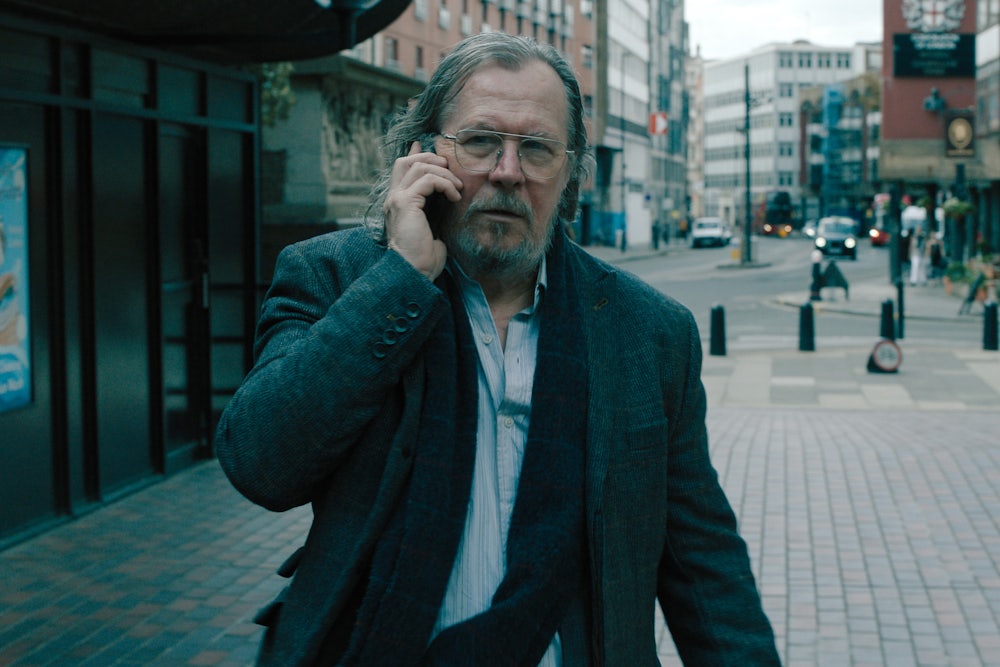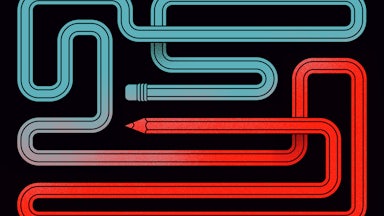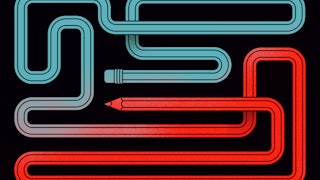Apple reinvented personal computing in the 1980s, and then again in the 2000s. It created a vast array of hot little rectangles that we carry everywhere with us, which—depending on who you ask—are either connecting or degrading the social lives of millions of people, and the company created a signature style that has seeped into the groundwater, influencing the design of everything from cars to coffee makers. But TV, it turns out, is hard to do. Apple TV+, the company’s foray into original streaming programming, has been a surprisingly awkward quest since its debut in 2019. The company is willing to pay outlandish amounts of money for original series—the upcoming season of the dystopian office dramedy Severance is reportedly costing $20 million per episode—and critics are always eager to laud the streamer’s successes, but it’s never seemed willing or able to effectively market its shows to actual viewers. In June 2024, according to Nielsen, Apple TV+ accounted for just 0.24 percent of viewing on U.S.-based smart TVs. That’s lower than big name competitors like Netflix (8.4 percent) and Hulu (3 percent), but also significantly behind modest streamers like Tubi and the Roku Channel.
Cupertino’s routine loss of the ratings war to Roku City really has to hurt, because Apple TV+ has long been the streamer most willing to dole out cash for prestige. High-concept, highbrow epics like Foundation and For All Mankind, well-heeled literary adaptations like Pachinko, big-time producers like Steven Spielberg and Tom Hanks, a-list actors like Reese Witherspoon and Brie Larson and Colin Farrell, preposterously high production values for even its most small-scale series—nothing on TV looks better than an Apple TV+ show. While many of these series have been absolute whiffs, the streamer has also bet (and won) on wonderful risks like Dickinson and (for at least a little while) Ted Lasso. But money alone can’t buy Apple either the raw viewing numbers or the cultural capital it’s after.
As a result of all of this, Apple recently announced it would be scaling back TV production. This is a shame. If good television is going to survive and evolve in the increasingly vast wasteland of the streaming era, it’s going to need extravagant patrons like Apple. And while Apple might understand itself as the next HBO, its real strength lies, ironically, in its more humble series. Hijack, Silo, Criminal Record, Presumed Innocent—Apple has, arguably, the greatest middlebrow roster available on streaming right now. If any of its detective shows or legal thrillers were streaming on Netflix, they’d be everybody’s water-cooler obsession. But due to the streamer’s marketing foibles, they remain crowd-pleasers playing to vanishingly small crowds. Perhaps no series embodies this predicament more than Slow Horses, your favorite show that you might not yet know exists.
The best way to describe Slow Horses—whose fourth season debuts this fall—is that it’s an underdog spy thriller. One of the enduring images of Tomas Alfredson’s great 2011 feature film adaptation of John le Carré’s Tinker Tailor Soldier Spy is the shot of the heads of British intelligence convening around a conference table in what looks like a freestanding trailer or structure deep inside their larger headquarters. Almost vaultlike, the nerve center of their operations is rooted in the innermost core of the vast agency. Like Alfredson’s Tinker Tailor, Slow Horses is also a knotty drama about British intelligence starring Gary Oldman, but, unlike le Carré’s tale, Slow Horses is about agents both physically and institutionally on the outs.
Based on British mystery novelist Mick Herron’s popular series, and developed by English comedian and writer Will Smith, the show focuses on a group of misfit agents, who, exiled from The Park (the show’s fictionalized MI5 headquarters), have been filed quietly away at a run-down off-site campus called Slough House. Their leader is Jackson Lamb (Oldman), a viscerally disgusting career spook and veteran of the Cold War who’s been handed the reins at Slough House as punishment for years of impolitic shenanigans within the agency. His office is the home to a shambling squad of agents, all pushed out of active service but not sacked. Slough House is a purgatory for addicts, assholes, and fuckups. Part of the premise of the show, however, is that few of these agents are, in fact, bad at their jobs. They’ve arrived at Slough House because of personality defects rather than professional incompetence; some of them are there simply because they were in the wrong place at the wrong time. When a particularly unpromising or embarrassing case comes up, it gets tossed over to Slough House—where the slow horses get the job done, even if things get a little sloppy.
Our point-of-view character in this musty universe is River Cartwright (Jack Lowden), the handsome, pedigreed nepo baby grandson of a former MI5 chief (Jonathan Pryce). He lands at Slough House as a casualty of internal politics, the fall guy in a petty conspiracy that becomes clearer over the course of the show’s first season. He’s a talented agent who knows too many secrets, and so his competence does not endear him to The Park; it usually puts him at odds with the bosses’ schemes, especially those of the elegant and ruthless Deputy Director-General Diana Taverner (Kristin Scott Thomas).
This season begins with Cartwright even further outside the orbit of The Park. After an assassin attempts to kill his grandfather in his country home, Cartwright goes off-book, traveling to France to figure out who was targeting his grandfather and why. While he’s on his high-stakes study-abroad trip to the French countryside, the rest of Slough House is left to cover for him. Through a series of ingenious maneuvers, they distract Taverner and her boss, the new MI5 chief, Claude Whelan (James Callis), while Cartwright unravels a multigenerational conspiracy that ultimately implicates them all.
From foot chases through London’s St. Pancras station to thrilling shoot-outs with Terminator-like French assassins, the show is casually competent with action set pieces. But the show also remains one of the funniest series on TV: Smith and his writers have an incredible ear for comedic pitter-patter. When a new MI5 agent asks Lamb what it’s like being in charge of the rejects, he shoots back, “they don’t like being called that.” She asks what he calls them. “The rejects,” he replies. Lamb plays up his sarcasm, his cruelty toward his employees, even his repulsiveness, so that his interlocutors focus on that rather than on his latest schemes. Lamb’s feel for colorful language spreads to the rest of the slow horses. This season, when Cartwright has a climactic confrontation with a rogue ex-CIA terrorist (Hugo Weaving), the villain’s earnestly evil philosophical platitudes—“someone offers you their hand, you show them your fist”—grate against his sensibility. “I feel like I’m at a TED talk,” he replies.
Likability is not usually a valuable or even healthy metric by which to judge fictional characters or a show itself, but intense likability is a big part of the appeal of Slow Horses. Lowden and Oldman are extremely charismatic leads, and the broader ensemble cast is filled with charming role players, from Christopher Chung’s half-baked lothario hacker Roddy to Aimee-Ffion Edwards’s twitchy emo agent Shirley. It sometimes takes an outsider to see how cohesive this group of misfits really is: This season, a new agent lands at Slough House, a traumatized former psychological warfare specialist who spends most of the day silently sitting in the corner, watching the slow horses at work. Midway through the season, he dramatically snaps his silent streak in order to break up a bickering argument between Shirley and a co-worker. Keenly observing the two, just as we viewers do, he accurately points out that the only reason they fight so much is because they genuinely care about each other and their work. The misery they all wallow in is really a front; Slough House is a family. And, just as in the three seasons prior, Slow Horses trades in on all that goodwill with its willingness to kill off characters you like.
This is both a trick the show pulls and a kind of narrative philosophy. Even as it keeps a bouncy step, each season of the show has dispatched at least one beloved member of Slough House. Slow Horses pivots between acknowledging the deadly stakes of its capers and depicting those capers with a patented slapstick joy. Every character in Slough House is a lovable ragamuffin with killer instincts and a fatal flaw. Ninety percent of the time, those flaws contribute to a show about top-level espionage carried out in amusingly ramshackle form. But for some small, but not insignificant, amount of time, those flaws are indeed fatal to their bearers.
It would be a bit of a stretch to say that Slow Horses has something to tell us about Apple TV+’s struggles in the world of prestige television. But it’s hard not to notice that, at several levels, Slow Horses is a show about the deadly folly of prestige. The main thesis of Slow Horses is that, while there may be a difference in glory and resources between The Park and Slough House, it’s invariably the gritty, low-class exiles who save the day. Just because Taverner and her “dogs”—a crew of toughs, dressed all in black—look sharp doesn’t mean they are. Likewise, just because Lamb and his sheep look (and smell) bad doesn’t mean they aren’t England’s last line of defense against spectacular violence.
River Cartwright is an intriguing point-of-view character because he does not seem to belong with the misfits in Slough House; he’s a born-and-bred agent with all the qualities of an elite spook. Through him, the show offers a rejection of the prestige logic of the intelligence service itself. As he works alongside his scrappy Slough House peers, it soon becomes clear that it’s The Park, full of careerists and politicians, where he’s out of place. The rise of Whelan—who’s out of his depth operationally but politically savvy enough to have climbed the ranks with a rhetoric of “transparency”—makes clear how vacuous the leadership is.
In 2016, the cultural critic Angelica Jade Bastién warned against modern TV’s perilous obsession with prestige style and made the case for the pleasure of middlebrow TV. Prestige, she wrote, “has put a stranglehold on television’s creativity.” Apple has made many shows with this problem: heavy with their own ambition, joyless, dank, the sort of program you watch out of obligation rather than fascination. Meanwhile, Bastién argued, middlebrow series—the genre show, the “fun” drama rather than the “difficult” drama—are liberated from the crushing self-consciousness of the twenty-first-century TV revolution.
Apple tried to build its brand around the glowing prestige of its expensive, ambitious art projects. And, while some of those series are worth the attention, few of them can compete with the relatively straightforward pleasures of a show like Slow Horses. To love this show isn’t to lower one’s expectations; it’s to realize that the “high” expectations that define the past two decades of TV are themselves a constraining illusion, a fake-out, a red herring. It’s not easy to make a show this crisply funny, grippingly twisty, and endearingly acted. Slow Horses understands the assignment.






